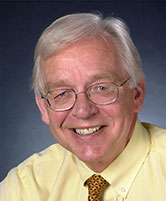
Dr Edward K. Rynearson
MD, FAPA, FACP, FRANZCP
Edward ‘Ted’ K. Rynearson, is a clinical psychiatrist and researcher from Seattle Washington where he founded
the section of psychiatry at the Mason Clinic.
In addition to full-time clinical practice, he has served on the clinical faculty of the University of Washington as a Clinical Professor of Psychiatry. For over 20 years, Dr Rynearson has maintained
a particular clinical and research focus on the effects of violent death
on family members and has been published in clinical papers, book chapters and two books,
Retelling Violent Death and
Violent Death: Resilience and Intervention Beyond the Crisis. He has delivered numerous national and international training on the management of
the clinical effects of violent death and with grant support founded the non-profit organisation the Violent Death Bereavement Society (
www.vdbs.org), establishing an informative network for service providers, teachers and researchers of traumatic grief after violent death. Most recently he has developed a collaborative training program for Israeli and Palestinian clinicians in supporting members of their communities with traumatic grief associated with violent death. Dr Rynearson lives on Puget Sound where he rows each dawn in his rowing scull (weather and tide permitting) and almost always sees a seal or an eagle.
Keynote Presentation
Traumatic Grief After Violent Dying
Contemporary research indicates there are differences between the bereavement experiences of individuals grieving non-violent versus violent death losses. In fact, studies suggest that violent death
can be particularly challenging for mourners on a variety of levels. Individuals bereaved by homicide, suicide, and fatal accident appear to face distinct challenges physically, psychologically, socially and spiritually. As a result of the loss, many experience shock and horror at the manner of death, a disruption of their assumptive world, traumatic dysregulation of their physiology, relational strain in their social network, an inability to make sense of the death, or a spiritual crisis. There are a number of factors that may place survivors of violent loss at an increased risk for elevated levels of psychological distress as they struggle in accommodating.
This session will discuss aspects of poor bereavement outcome in violent death survivors in the form of traumatic grief. More research and greater awareness is needed in relation to these unique and complicating aspects while mourning the sudden, violent death of a loved one. The objective of this session is to increase understanding on how this understudied and underserved population copes with the loss of a loved one
to violent death, while evaluating the clinical implications of high levels of psychological distress and other factors facing survivors. Drawing on the speaker’s ongoing research activities and extensive clinical experience with traumatic grief, this session will discuss theory, case examples and clinical principles illustrating the inherent differences found in unexpected, violent bereavement, and outline a manualised short-term intervention (Restorative Retelling) shown to be particularly helpful in treating this population.
Dr Rynearson will present this session as part of the Conference program on Friday, 13th May 2016.
Dr Rynearson will also be conducting a one-day pre-conference workshop on Tuesday, 10th May 2016.